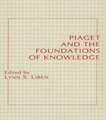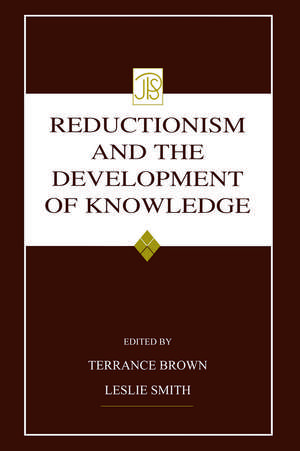Reductionism and the Development of Knowledge: Jean Piaget Symposia Series
Editat de Terrance Brown, Leslie Smithen Limba Engleză Paperback – 9 iul 2013
Since Helmholtz, there has been increasing concern in the life sciences about the role of reductionism in the construction of knowledge. Is psychophysics really possible? Are biological phenomena just the deducible results of chemical phenomena? And if life can be reduced to molecular mechanisms only, where do these miraculous molecules come from, and how do they work? On a psychological level, people wonder whether psychological phenomena result simply from genetically hardwired structures in the brain or whether, even if not genetically determined, they can be identified with the biochemical processes of that organ. In sociology, identical questions arise.
If physical or chemical reduction is not practicable, should we think in terms of other forms of reduction, say, the reduction of psychological to sociological phenomena or in terms of what Piaget has called the "reduction of the lower to the higher" (e.g., teleology)? All in all, then, reductionism in both naive and sophisticated forms permeates all of human thought and may, at least in certain cases, be necessary to it. If so, what exactly are those cases?
The papers collected in this volume are all derived from the 29th Annual Symposium of the Jean Piaget Society. The intent of the volume is to examine the issue of reductionism on the theoretical level in several sciences, including biology, psychology, and sociology. A complementary intent is to examine it from the point of view of the practical effects of reductionistic doctrine on daily life.
Din seria Jean Piaget Symposia Series
-
 Preț: 466.88 lei
Preț: 466.88 lei -
 Preț: 445.16 lei
Preț: 445.16 lei -
 Preț: 480.81 lei
Preț: 480.81 lei -
 Preț: 490.18 lei
Preț: 490.18 lei -
 Preț: 488.92 lei
Preț: 488.92 lei -
 Preț: 485.69 lei
Preț: 485.69 lei -
 Preț: 487.59 lei
Preț: 487.59 lei -
 Preț: 487.59 lei
Preț: 487.59 lei -
 Preț: 483.79 lei
Preț: 483.79 lei - 12%
 Preț: 325.34 lei
Preț: 325.34 lei - 12%
 Preț: 325.34 lei
Preț: 325.34 lei - 42%
 Preț: 209.80 lei
Preț: 209.80 lei - 12%
 Preț: 325.34 lei
Preț: 325.34 lei -
 Preț: 446.13 lei
Preț: 446.13 lei -
 Preț: 446.13 lei
Preț: 446.13 lei -
 Preț: 322.79 lei
Preț: 322.79 lei - 18%
 Preț: 992.90 lei
Preț: 992.90 lei - 18%
 Preț: 1000.73 lei
Preț: 1000.73 lei -
 Preț: 456.11 lei
Preț: 456.11 lei - 18%
 Preț: 786.07 lei
Preț: 786.07 lei - 18%
 Preț: 1002.94 lei
Preț: 1002.94 lei - 26%
 Preț: 737.60 lei
Preț: 737.60 lei
Preț: 322.47 lei
Preț vechi: 415.97 lei
-22% Nou
Puncte Express: 484
Preț estimativ în valută:
61.76€ • 63.63$ • 51.73£
61.76€ • 63.63$ • 51.73£
Carte tipărită la comandă
Livrare economică 24 februarie-10 martie
Preluare comenzi: 021 569.72.76
Specificații
ISBN-13: 9780415651387
ISBN-10: 0415651387
Pagini: 248
Dimensiuni: 152 x 229 x 15 mm
Greutate: 0.36 kg
Ediția:1
Editura: Taylor & Francis
Colecția Psychology Press
Seria Jean Piaget Symposia Series
Locul publicării:Oxford, United Kingdom
ISBN-10: 0415651387
Pagini: 248
Dimensiuni: 152 x 229 x 15 mm
Greutate: 0.36 kg
Ediția:1
Editura: Taylor & Francis
Colecția Psychology Press
Seria Jean Piaget Symposia Series
Locul publicării:Oxford, United Kingdom
Public țintă
ProfessionalCuprins
Contents: Preface. T. Brown, Reductionism and the Circle of the Sciences. Part I: Ways of Understanding. W.F. Overton, Understanding, Explanation, and Reductionism: Finding a Cure for Cartesian Anxiety. W.C. Wimsatt, Evolution, Entrenchment, and Innateness. J.O.F. Vega, G. Hernández, J.J. Rivaud, Reductionism in Mathematics. Part II: Representation. M.H. Bickhard, The Biological Emergence of Representation. T. Nunes, The Role of Systems of Signs in Reasoning. L. Morgado, The Role of Representation in Piagetian Theory: Changes Over Time. C. Lightfoot, Breathing Lessons: Self as Genre and Aesthetic. Part III: Looking Toward the Future. L. Smith, From Epistemology to Psychology in the Development of Knowledge.
Descriere
The papers collected in this volume are all derived from the 29th Annual Symposium of JPS.The intent of the volume is to examine the issue of reductionism on the theoretical level in several sciences, including biology,psychology,&sociology.
















